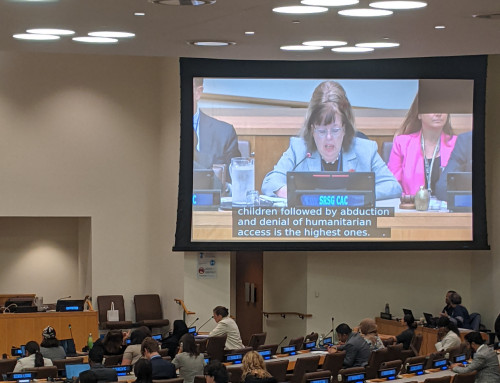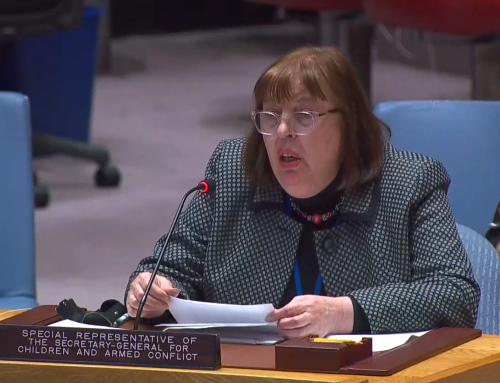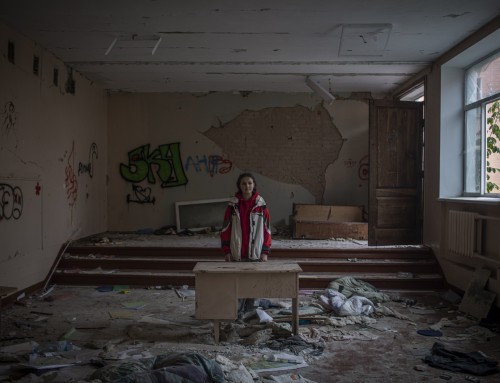PROMOTION AND PROTECTION OF THE RIGHTS OF CHILDREN
Wednesday, 13 October 2010
Mr. President,
Yesterday, my office screened a film entitled the Children of War as part of our
Zero under Eighteen campaign for universal ratification of the Optional Protocol
to the Convention on the Rights of the Child on the Involvement of Children in
Armed Conflict. The moving film illustrates the reasons why no child should ever be
used in armed hostilities and no child under eighteen should be conscripted into
armed forces or armed groups.
Despite the fact that thousands of children continue to be exploited as soldiers
around the world, last year we achieved some notable successes in our attempt to
save children from this horrible practice. The United Nations, working as one,
facilitated the release and discharge of almost 3,000 children from Maoist
cantonments in Nepal and stands ready to assist with their reintegration. The Sudan
People’s Liberation Army, which entered into an action plan with the United
Nations in November last year, has promised to release around nine hundred
children by the end of this year, once programmes for their rehabilitation are put in
place. The Justice and Equality Movement in Sudan signed a memorandum of
understanding with UNICEF granting child protection monitors access to its camps
to assist in the release of children. In the Philippines, the MILF entered into an
action plan with the United Nations and partners are now in the process of putting
together programmes for children’s rehabilitation and reintegration. In Burundi, all
children associated with the FNL have been released and reunified with their
families. These successes only underscore the need to continue with our efforts to
ensure that all other groups listed in the Secretary-General’s annexes for recruiting
and using children enter into action plans with the United Nations for the release of
children.
Mr. President,
This year also marked the first time that parties committing sexual violence against
children or who kill and maim children have been listed in the annexes of the
Secretary-General’s report. With regard to sexual violence, the Country Task Forces
on the ground are in the process of establishing modalities to improve the collection
and verification of information on sexual violence, as well as to ensure a more
systematic exchange and sharing of information that would inform advocacy and
response against this grave violation. My Office is also in discussions with UNICEF
and the new Special Representative on Sexual Violence in Conflict to issue guidance
notes to the field helping them to capture the true nature and scale of the violations
being committed. Over the course of the year, my Office has attempted to galvanise
attention and support around the dilemmas faced by internally displaced children.My report to the General Assembly last year contained an annex outlining the Rights
and Guarantees that should be accorded to this vulnerable group of children. The
Assembly endorsed these guarantees in its resolution on internally displaced
persons. Since then, in consultation with partners, my Office has produced a
working paper as a tool to provide guidance to governments and protection partners
to ensure that children who are displaced are treated with care and dignity. Recently,
I was in Kabul and visited an IDP camp where I met a five year old named Fatima.
Thanks to UNICEF she was able to go school for the first time in her life, and she
was obviously delighted. However, her brother Mohammed was far more sullen. As
a young adult male he felt singled out and complained about the caves they had as
makeshift shelters and the lack of secondary education as well as vocational training.
He noted that international visitors come and go but nothing ever changes in the
camps. His words were a reminder of the fact that disgruntled children in such
camps are always susceptible to being recruited by armed groups, unless there is a
targeted policy aimed at meeting their needs.
Mr. President,
Despite some of the accomplishments we have had over the last year, a great many
challenges remain. The recent events in the Democratic Republic of Congo highlight
the fact that sexual violence against women and children is a brutal reality in many
conflicts. We welcome the arrest of one of the perpetrators by MONUSCO and
concur with Special Representative Wallström that fighting impunity and bringing all
perpetrators to justice is an important step forward that will create the necessary
deterrence against future violations. However, any action, if it is to be sustainable,
must have national ownership and effective national institutions for accountability.
We look forward to working with the Government of the Democratic Republic of
Congo and other governments in supporting strategies for the prevention of sexual
violence, that hold perpetrators accountable and that respond to the needs of
survivors.
Many of these violations against children are committed by non-state actors who
often recruit children and whose cadres also commit other crimes against children in
the areas under their control. Many are listed in the Secretary-General’s report and
the only way for these parties to be de-listed is to enter into an action plan with the
United Nations. It is important that governments facilitate this process by allowing
the UN to access these vulnerable groups for humanitarian needs such as the
protection of children so that the United Nations is in a position to have children
released. All such action, of course, would be in full consultation with the State
concerned. The cause of children has always transcended politics at the United
Nations and we hope this too will not be an exception.
Despite all our efforts, there are still persistent violators who have been listed yearly
in the Secretary-General’s report. It is now important that we move toward targeted
measures against some of these recalcitrant parties. I am pleased to inform this
august body that in May this year the Sanctions Committee for the Democratic
Republic of Congo heard submissions from my Office and that the charges of
recruitment and use of children were added as grounds for sanctioning certain
individuals. We need to move forward in the other relevant Sanctions Committees
and set up mechanisms for parties and groups that are not subject to existing
committees.
Mr. President,
One of the main challenges facing our partners on the ground is that once children
are released to us by concerned parties, we are often left with a resource gap and
remain unable to provide the necessary services for the children. Best practices in
this area require a sustained engagement with the affected children over at least a
two year period with child protection partners in a position to interact with family
and the community in addition to the child. Without the necessary follow up,
children may easily be re-recruited or end up in street gangs or as street children. For
this reason, it is important that donors, both national and international, follow
through with reintegration and respond effectively to the call for increased reliable
and long term funding for these programmes. At the moment, we are facing
resource gaps in all situations of concern, including the Philippines, Sudan and the
Central African Republic. We hope that over the course of this year, there will be
response to our appeal so that all affected children will have the benefit of effective
and sustainable reintegration and rehabilitation programmes.
I was in Gulu, Northern Uganda in June this year and interacted with some former
child soldiers who had undergone a period of rehabilitation. One girl, who had
become skilled in sewing, displayed some of her beautiful handicrafts. Though she
had a terrible childhood as a sex slave and bearing the burden of a bullet wound in
her leg, she looked forward to the future. Most reintegration plans attempt to
reintegrate children back with their families and into the village community.
However, some former child soldiers told us that they had become accustomed to
life in the IDP settlements that had a city-like atmosphere. They preferred to live in
the city. These developments have posed new challenges to child protection partners
working in the field. For youth and returning young mothers, finding sustainable
and viable employment strategies remains a significant challenge.
Mr. President,
We are also facing new dilemmas in an increasingly changing world. One such
development is the increases in the attacks on schools, teachers and students in
some parts of the world. This despicable practice is accentuated by the fact that
during war, schools are no longer sacrosanct and they are often bombarded or used
as barracks by troops. School is the only space for normalcy for children in conflict
areas. It is important that they be recognized as zones of peace by all parties to
conflict. The attacks on girls going to school are particularly disturbing. It is
important that we work with local communities so that they take action to defend
the schools and children are kept safe.
As the nature of warfare changes, our office, along with our partners, has recently
been encouraging peacekeeping contingents and national armies on finalizing rules
of engagement for the protection of children during military operations. We urge
them to conduct joint military-civil assessments of the security risk for populations;
to refrain from using heavy artillery in densely populated areas; to protect schools
and hospitals; and to develop procedures for the reception, treatment and rapid
handover of children to UN child protection partners. In addition, all proper
precautions should be taken before every aerial assault in populated areas to prevent
any civilian casualties. We strongly hope that all governments conducting military
operations will abide by these simple rules, so that more children are protected.
Another area of concern is the problem of justice and children affected by armed
conflict. My report to the General Assembly contains principles that should be
applied in situations where there are transitional justice provisions. In such justice
processes, children are often the victims who need access to the system for redress.
Their participation in justice processes should be carefully managed so that they are
not in put in danger or re-traumatized by the proceedings.
In addition to being victims, as former child soldiers, girls and boys often come
before the justice system as perpetrators. Again there is a need to agree on a set of
principles. The International Criminal Court and international criminal practice has
made it clear that children should not be tried for war crimes or crimes against
humanity. With regard to any lesser charge, the process must satisfy the Beijing
Principles on Juvenile Justice. We expect all countries, especially those who have
been in the forefront of the struggle for the rights of children, to respect these
principles so that children who are used by adults in wars not of their own seeking
are not given grave punishments. We agree that children should face the moral
implications of their action. We urge rehabilitation and a process that focuses on
restorative justice.
When we talk about justice, we cannot forget children in detention who are kept in
jail because of minor charges of either throwing stones or more complex concerns
such as being associated with armed groups or recruited by unscrupulous adults.
Again we urge that we move away from punitive measures toward rehabilitation and
education. Children should not be brought before military or administrative
tribunals. They must be taken care of by juvenile justice processes that protect and
respect their rights while taking note of their age and capacity for judgment.
Finally, another emerging challenge is one that squarely fits in with the priorities of
this Assembly. It would be apparent to most people that the MDG indicators for
children are among the worst in armed conflict zones. About a third of the total
number of children not having a primary education are living in conflict zones. This
pattern is also true for other MDGs affecting children. My office hopes to work
with Mr. Anthony Lake’s “Equity Campaign” for UNICEF by identifying children
in conflict zones as one of the most vulnerable groups of children requiring priority
funding by the international community.
Mr. President,
To re-iterate, my Office along with UNICEF and the Office of the High
Commissioner for Human Rights are aiming for the universal ratification of the two
Optional Protocols to the Convention of the Rights of the Child. The Optional
Protocol with regard to the Involvement of Children in Armed Conflict is the one
that is directly within my mandate and my Office is implementing a Zero under
Eighteen campaign to ensure that every country has signed to make child soldiers a
phenomenon of the past. With universal ratification, we will be able to argue
persuasively that there is an international moral consensus against this practice and
that those who engage in this practice are outlaws in the true sense of the word. The
film we showed yesterday captures the human cost of this practice and shows the
difficulties faced by former child soldiers of the LRA. You watch as children grapple
with the moral implications of their actions, and struggle between their instincts to
forgive and their instincts for justice. A child in pain is everyone’s child and what we
are fighting for today is for the world’s children.
Thank you Mr. President





